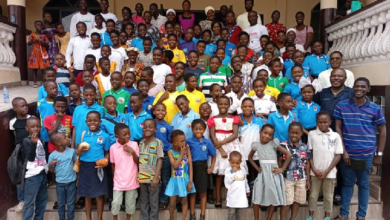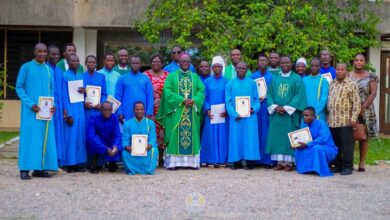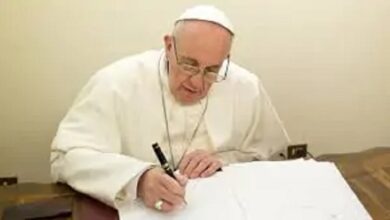EDITORIAL

Not for the last time, till “Galamsey” is decisively dealt with, The Catholic Standard will be compelled to raise the vexing issue of irresponsible, as well as illegal mining (Galamsey) in the country.
This time round, we are adding ours to the voices of over 30 non-state groups: particularly Civil Society Organisations (CSOs), Religious Bodies and Organised Labour, in calling on the government to meet the four demands contained in all public outcries against “galamsey”: These are a declaration of a state of emergency, an executive order to put on hold all small-scale gold mining (licensed or illegal), the revocation of LI 2462 and an immediate action plan in the face of the “galamsey” crisis.
Whether licensed or illegal, free-for-all small-scale gold mining activities have severely poisoned farmlands with deadly mercury, lead, and cyanide. They have killed wildlife and plant resources in our Forest Reserves. The Ghana Water Company Limited has warned that its treatment plants are at risk of a breaking point, having to process highly contaminated water from rivers poisoned by “galamsey” sources. As a result, quality water supply to many educational institutions and homes is questionable. And yet, a Government and a Parliament have superintended a law to desecrate parts of the country’s forest, preserved and reserved for prosperity! If this is not a national crisis, demanding a crisis response, what is?
There is a sense in the growing pressure by well-meaning Ghanaians, from academics to Religious Leaders and Organized Labour, on government to take a decisive action NOW against galamsey (and not later). The call is for: i) to put on hold all small-scale gold mining (licensed or illegal), ii) the revocation of LI 2462, and iii) an immediate action plan in the face of the “galamsey” crisis.
It may be a fact that many politicians are in the pocket of “galamsey” lords. The Speaker of Parliament has implied it; the Minister of Security may not deny in confidential reports the widespread complicity of duty bearers at “galamsey” sites. Intelligence abounds regarding how deep and widespread the “galamsey” fight has been allowed to be compromised with money. Even local, poor communities (including their chiefs) are not immune to monetary influence, and are at their most vulnerable point to “galamsey” exploitation. That the Minister of Security chairs the recent presidential committee against “galamsey” speaks volumes about the “galamsey” menace, but the government is not ready or willing to ‘bell the cat’.
Is it not a too well-known fact that politicians take refuge in our short memories? However, today several individual Ghanaians and bodies will not have any of that. If the government was, indeed, serious about fighting irresponsible small-scale gold mining, it would not have issued too many licenses for Small Scale Mining in the country. If the government was serious and intentional, Ghana will not reportedly lose about 2.5 million hectares of forest reserves to illegal and uncontrolled mining, with significant threat to biodiversity. It is reported that more than 100,000 acres of cocoa farms and over 30,000 acres of oil palm plantations have already been destroyed in the past few years. Which serious government would prioritise unrenewable gold mining and trade away its sustainable cocoa production with gold mining? Indeed, if the government is serious about fighting irresponsible mining, it would not have initiated the passing of LI 2462. And certainly not in a country notoriously famous for its culture of non-enforcement of laws.
The current crisis point of “galamsey” is not an issue about not knowing. It is an issue of unwillingness by the political class, precisely the fear of losing votes. The setting up of yet another ‘ministerial’ committee, similar to failed past committees to deal with “galamsey”, only feeds the notion of time-buying. Committees are synonymous with inaction. Whenever a government is unwilling to act, the smart thing to do is to buy time by setting up committees, fully aware that committee recommendations will either not be acted upon or will soon be forgotten. Mitigating environmental destruction is futuristic and yes, can be entrusted or delegated to a ministerial committee. However, restoring water bodies to their pristine form and insisting on strict enforcement of mining regulations are not futuristic; they are non-optional; nor can they be treated as post-election issues.
We applaud Organized Labour for its unflinching stand and maintained position on the “galamsey” crisis at its September 17 stalemate meeting with the 5-member ministerial committee. Sooner than later, the government tactic of buying time will fall through the cracks. The challenging task of saving our rivers, aquatic life, forests and wildlife NOW are not optional. They ought not to go beyond the deadline of September 30, which many organizations have pledged to. Meetings should not be a forum for groups to voice out concerns. The burden should be rather on the government to justify why declaring a state of national emergency, suspending certain mining operations, revoking LI 2462 and providing a drastic, immediate crisis response are not matters of urgent national survival. The economic argument in defense of “galamsey” in a country where millions of dollars are lost to corruption exposes government to the insincerity of officialdom.
The Asantehene, Otumfuo Osei Tutu II, has taken the lead in taking drastic actions against his chiefs who are involved in galamsey. Why can’t the government do same by sanctioning its appointees said to be involved in galamsey and even ban the act altogether? The time for the government to act is now!!!



